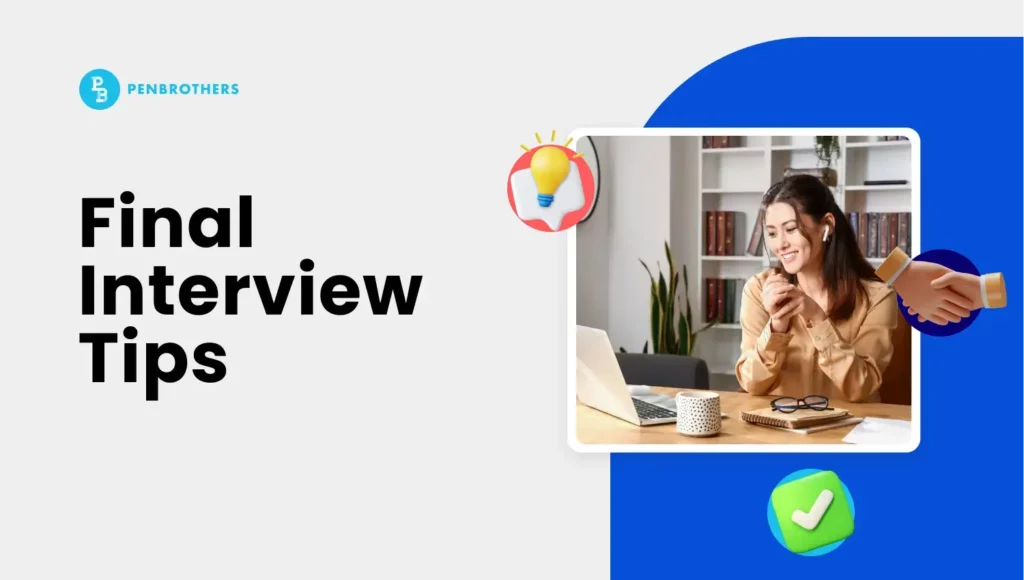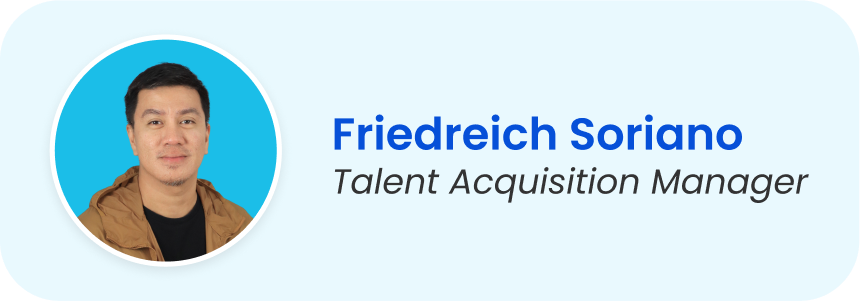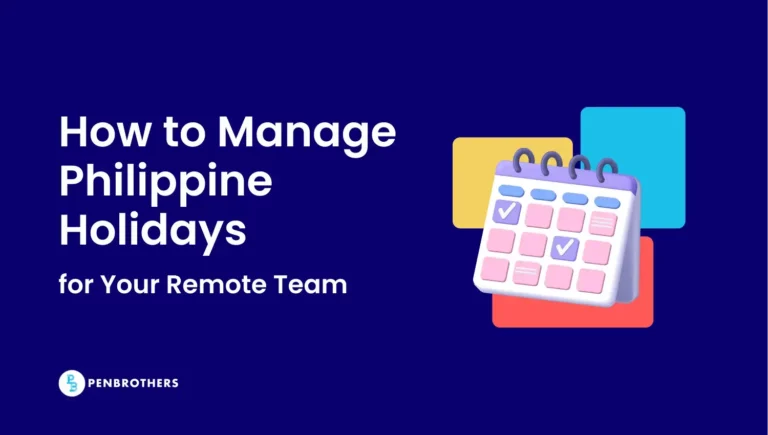Are you looking for a new job? A new organization to join and make a difference? Got the “new start” spirit that comes with the new year? You’re not alone!
The first quarter of the year, particularly January to February, is known as the peak season for job hunting. As job seekers pursue a fresh start at the start of the year, they’re also looking for practical tips on how to secure job offers.
One of the most daunting parts of job seeking is the final interview. Usually done by senior managers and executives, answering final questions can be frightening. Why? While initial interviews are more technical in nature and often discuss experiences, the final round of interviews is usually the “make-it-or-break-it” round in the hiring process.
The good news, though, is that it doesn’t have to be!
We’ve asked our Talent Acquisition team, who are in close collaboration with hiring managers, for their tips on how to answer final questions and get that job offer.
Key Takeaways
- It’s About ‘How’ You Think, Not Just ‘What’ You Know: The final interview is not a technical skills test; it’s an evaluation of your strategic thinking, cultural fit, and leadership potential. Executives are more interested in your problem-solving process than in a single correct answer.
- Preparation and Consistency are Crucial: Success in the final round depends on thorough preparation. This includes being consistent with answers from earlier interviews, knowing the job description by heart to align your competencies, and researching the company and interviewers to build rapport.
- Asking Thoughtful Questions is a Test of Engagement: The question, “Do you have any questions for me?” is a critical part of the interview. You should come prepared with focused, open-ended questions that demonstrate genuine interest and cannot be easily answered by a quick search of the company’s website.
- It’s a Strong Signal, But Not a Guaranteed Offer: Reaching the final interview means you are a top candidate, likely in the final 2-3. However, it is not a guaranteed job offer. The conversion rate from this stage is typically between 40-60%, with the final decision often coming down to intangibles like team chemistry.
What Kind of Questions Are Asked in the Final Interview?
Final round questions fall into four categories, each testing something different than your technical skills.
Strategic thinking questions: “Where do you see this role evolving in the next two years?” or “How would you prioritize competing demands in your first 90 days?” They’re not looking for perfect answers. They want to see how you think through complex problems.
Cultural integration questions: “Describe a time you disagreed with leadership” or “How do you handle feedback that challenges your approach?” These probe whether you’ll thrive in their specific environment, not just any environment.
Leadership and influence questions: “Tell me about a time you had to get buy-in without formal authority” or “How do you handle team conflicts?” Even for individual contributor roles, they want to understand your ability to drive outcomes through others.
Commitment and motivation questions: “Why are you leaving your current role?” and “What excites you most about this opportunity?” seem simple, but they’re testing for red flags. Inconsistent answers here kill more offers than people realize.
The curveball questions: “What would you do if you discovered a major flaw in our product?” or “How would you explain our business model to a five-year-old?” These test adaptability and communication under pressure.
Here’s what most candidates miss: final interview questions aren’t about having the right answer. They’re about demonstrating the right thinking process. The VP interviewing you cares more about how you approach problems than whether you know the textbook solution.
8 Tips on How to Answer Final Questions in Your Interview
✅ Be Consistent
Some interview questions have already been asked during earlier interviews in the same way or some variation, according to our Talent Acquisition Manager for Specialized Verticals Friedreich Soriano.
Be consistent with your answers to establish credibility and honesty. “From the first interview, you need to be clear to yourself on what your aspirations and motivations are, and what you can contribute,” says Friedrich.
✅ Align Your Competencies and Traits with the Role
Friedrich also shared that during the last interview, it’s crucial to align your skills with the requirements of the job and your character traits to the company’s culture.
For instance, if the role requires a skill in Search Engine Optimization (SEO), then you must have this skill first. Knowing which skills you must have is made possible by the next point.
Align your skills to the requirements of the job and your character traits to the company’s culture. -Friedreich Soriano, Penbrothers Talent Acquisition Manager for Specialized Verticals
✅ Know the Job Description by Heart
Thoroughly understand the job description, so you’ll know what to highlight during the interview, advises Executive Talent Acquisition Specialist Crisele Manuel.
This is also a way for you to understand the expectations of the company and how you will be measured for success.
✅ Research the Company and the Interviewers
Crisele says, “Research the company and the interviewers if there is available information. Believe me, it will work if you know a bit about them, so you can establish common ground.”
Getting to know the company and the interviewers also helps in building confidence and camaraderie. It would be like talking to an acquaintance where the atmosphere is light!
✅ Practice Answering the Most Common Questions
One last tip from Crisele is about practice. She recommends asking a family or friend to act as the interviewer and ask the most common interview questions like “Why do you want this job?” and “What are your career goals?”
This way, you come prepared with thoughts already coherent in your head and confident that you are suitable for the role for which you are applying.
✅ Highlight Your Achievements
Emphasize your achievements relevant to the role. Jola Borja, our Senior Talent Acquisition Specialist, shares this practical tip for nailing that final leg of interview.
When you’ve understood the job requirements, you can line up your accomplishments from previous roles that are helpful for interviewers to gauge your potential to succeed in the role you’re applying for.
Related article: On Career Shifts and Success: A Young Leader’s Take
✅ Stay Calm
Jola also shares one of the most important tips for job seekers: stay calm during the interview.
This means balancing enthusiasm, nerves, and confidence. Too much enthusiasm will come off as unprofessional and being nonchalant will make you appear aloof and uninterested. “Calmness demonstrates poise, instills confidence, and promotes the clear-headedness necessary for thinking on your feet,” according to Beth Braccio Hering of FlexJobs.
✅ Be Prepared to Answer “Do You Have Any Questions for Me?”
During final interviews, hiring managers usually ask if you have any questions for them. While this is often construed to be a simple formality, it’s actually helpful for you to have some thoughtful questions to ask.
To answer this question, start off by wrapping up the conversation with the last point and express your interest in the role. Then you can proceed to your questions, but make sure that they’re not easily answerable via the company’s website or social media pages.
“Tailor your questions to demonstrate your enthusiasm about the role and the company while gaining valuable insights to help you make an informed decision if an offer is extended. The best questions to ask are focused and open-ended,” shares Wecruitr CEO Jack Kelly on Forbes.
Here are some good examples of questions to ask the hiring manager:
- Is there any additional information you need to help you decide on my candidacy?
- How does the company support work-life balance for its employees?
- Could you provide any success stories or examples of employees in this or a similar role and how they’ve progressed within the organization?
The best questions to ask [during a job interview] are focused and open-ended. -Jack Kelly
Does a Final Interview Mean I Got the Job?
A final interview doesn’t mean you got the job. But it does mean something specific, and understanding what can save you weeks of anxiety.
What final interviews actually signal:
You’re in the top 2-3 candidates. Companies don’t waste C-level executive time on courtesy interviews. If you’re sitting across from a VP or director, you’ve cleared every technical and cultural hurdle except one: executive buy-in.
Budget approval is likely secured. Most companies don’t advance candidates to final rounds without knowing they can make an offer. The decision isn’t whether they can afford you, it’s whether you’re worth it.
The reality of decision-making:
I’ve seen candidates nail every final interview question and still not get offers. Sometimes another candidate simply has more relevant experience. Sometimes internal priorities shift. Sometimes the hiring manager changes their mind about what they need.
The decision often comes down to intangibles that have nothing to do with your performance: team chemistry, communication style, or how you’d fit with existing personalities.
How to actually read the room:
Time allocation tells the story. A 30-minute final interview that runs 60 minutes is a positive signal. Questions about your start date, references, or salary expectations suggest genuine interest.
But the biggest indicator? Whether they sell you on the company. When executives spend time explaining why you should want the role, they’re already mentally offering it to you.
Managing your expectations:
Final interviews have roughly a 40-60% conversion rate to offers, based on my experience with hundreds of placements. Better odds than earlier rounds, but still far from guaranteed.
The candidates who handle final interviews best treat them as mutual evaluation sessions, not one-way interrogations. You should be assessing whether you want to work for them as much as they’re assessing you.
Final Thoughts
Job hunting can be nerve-wracking for most, but when you come well-prepared, it can be a rewarding experience.
Final interviews are at the tail end of the hiring process, so it’s important to get it right. Remember, the best way out of an interview is to get through it, and we hope that these tips will help in doing just that and land you your dream job!
Ready to explore a new job this year? We can help you land your next role!
Frequently Asked Questions
The final interview is the “make-or-break” round designed to assess qualities beyond technical skills. It focuses on evaluating your strategic thinking, cultural fit, leadership potential, and overall commitment. Its main purpose is to secure buy-in from senior managers or executives.
It means you are a top contender, likely one of the final 2-3 candidates being considered. While it is a very strong positive signal, it is not a guarantee of an offer. The success rate from this stage is typically between 40-60%.
Expect questions that test your thinking process. They usually fall into these categories:
Strategic thinking (e.g., “How would you prioritize tasks in your first 90 days?”)
Cultural fit (e.g., “Describe a time you disagreed with a manager.”)
Leadership and influence (e.g., “How do you get buy-in without formal authority?”)
Commitment and motivation (e.g., “Why this opportunity?”)
The most important preparation steps are to be consistent with your answers from previous rounds, know the job description thoroughly so you can align your achievements, research the company and your interviewers to build rapport, and practice answering common questions to ensure your thoughts are clear and confident.
Positive signs that the interview is going well include the meeting running significantly longer than scheduled, the interviewer asking logistical questions about your potential start date or references, and the conversation shifting to where the interviewer begins “selling” you on the company and the role.








